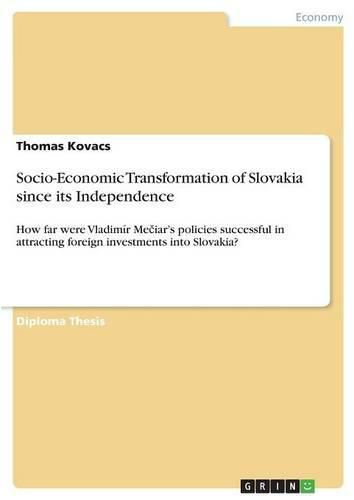Readings Newsletter
Become a Readings Member to make your shopping experience even easier.
Sign in or sign up for free!
You’re not far away from qualifying for FREE standard shipping within Australia
You’ve qualified for FREE standard shipping within Australia
The cart is loading…






Diploma Thesis from the year 2006 in the subject Business economics - Economic Policy, grade: 2, Fachhochschule des bfi Wien GmbH, language: English, abstract: This thesis analyses the socio-economic and political transformation processes of Slovakia since its separation from Czechoslovakia. The main question to be answered is how successful Prime Minister Vladimir Meciar’s policies were in attracting FDI into Slovakia. After the Velvet Revolution in 1989, Czechoslovakia started to initiate fundamental democratic measures concerning the public administration in the country. Two interconnected reforms took place in 1990: decentralization and the civil service reform. In 1992 a new government was voted into office under the leadership of Prime Minister Vladimir Meciar from the HZDS party. On 1 January 1993 Slovakia became independent by non-violent means from the Czech Republic, with Bratislava as its capital. For a country, which did not have economic wealth as high as the Czech Republic and an increasing unemployment rate, the total change of their whole economy meant that much time was spent on the question of how to finance the state. In terms of economic changes, the Prime Minister wanted to create a strong entrepreneurial Slovakian class that would be able to control the economy. But his privatization policies led to financial difficulties for the Slovakian state, its economy and its people. Although there was co-operation with Russia, the unemployment rate in Slovakia remained at 16.2% percent at the end of 1998. Constant discriminations in Slovakia and the fact that Meciar excluded the opposition parties completely from parliamentary control organs, the Slovakian Secret Service (SIS), the media and the process of privatization, caused international protests against Meciar and his regime. This caused the EU to warn Slovakia that it would no longer receive assistance, if the government continued to misuse its power.
$9.00 standard shipping within Australia
FREE standard shipping within Australia for orders over $100.00
Express & International shipping calculated at checkout
Diploma Thesis from the year 2006 in the subject Business economics - Economic Policy, grade: 2, Fachhochschule des bfi Wien GmbH, language: English, abstract: This thesis analyses the socio-economic and political transformation processes of Slovakia since its separation from Czechoslovakia. The main question to be answered is how successful Prime Minister Vladimir Meciar’s policies were in attracting FDI into Slovakia. After the Velvet Revolution in 1989, Czechoslovakia started to initiate fundamental democratic measures concerning the public administration in the country. Two interconnected reforms took place in 1990: decentralization and the civil service reform. In 1992 a new government was voted into office under the leadership of Prime Minister Vladimir Meciar from the HZDS party. On 1 January 1993 Slovakia became independent by non-violent means from the Czech Republic, with Bratislava as its capital. For a country, which did not have economic wealth as high as the Czech Republic and an increasing unemployment rate, the total change of their whole economy meant that much time was spent on the question of how to finance the state. In terms of economic changes, the Prime Minister wanted to create a strong entrepreneurial Slovakian class that would be able to control the economy. But his privatization policies led to financial difficulties for the Slovakian state, its economy and its people. Although there was co-operation with Russia, the unemployment rate in Slovakia remained at 16.2% percent at the end of 1998. Constant discriminations in Slovakia and the fact that Meciar excluded the opposition parties completely from parliamentary control organs, the Slovakian Secret Service (SIS), the media and the process of privatization, caused international protests against Meciar and his regime. This caused the EU to warn Slovakia that it would no longer receive assistance, if the government continued to misuse its power.